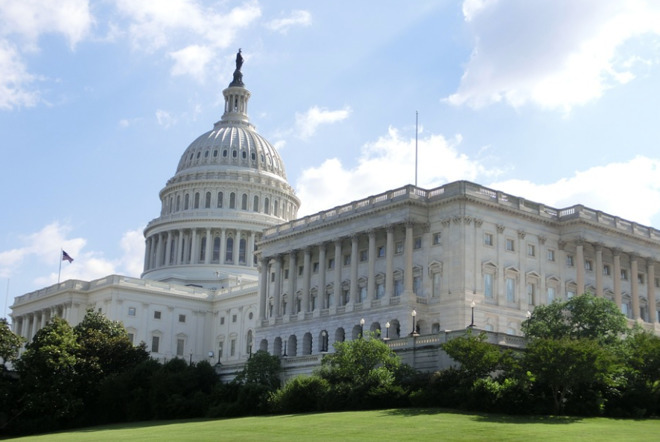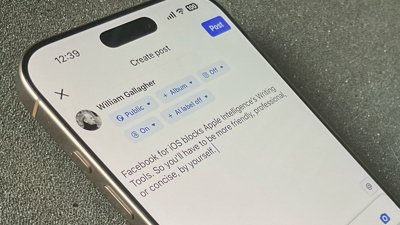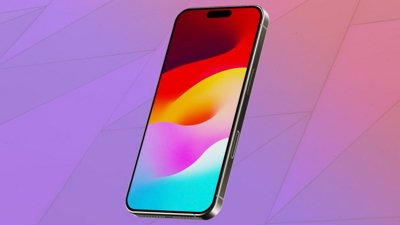Apple will advise to the Senate it supports federal regulations relating to privacy, a report ahead of the September 26 hearing claims, with the iPhone producer expected to testify to lawmakers how its personal data policies differ from other tech giants.
During the hearing on "Examining Safeguards for Consumer Data Privacy" on Wednesday, Apple will be represented by Bud Tribble, vice president of software technology and leader of the company's privacy engineering work, according to prepared testimony obtained by Axios. Tribble is expected to spell out the differences between Apple's and its competitor's privacy stances and how they relate to business strategies.
As previously insisted by the company multiple times, Tribble will advise that Apple is a hardware producer that does not need to make money from its users data. This is unlike many of its competitors, including Google, who center their business model around the collection and usage of data, for marketing and other purposes.
"We want your device to know everything about you; we don't feel that we should," Tribble is expected to say. "These concepts have guided our design process for years because privacy is a core value at Apple, not an obligation or an aftermarket add-on."
Tribble is also anticipated to "convey Apple's support for comprehensive federal privacy legislation that reflects Apple's long-held view that privacy is a fundamental human right" during proceedings.
The hearing is described as an opportunity for the committee to "examine privacy policies of top technology and communications firms, review the current state of consumer data privacy, and offer members (of the committee) the opportunity to discuss possible approaches to safeguarding privacy more effectively.
Tribble will be accompanied by representatives from Google, Twitter, Amazon, AT&T, and Charter Communications. While a social media giant, it is notable that Facebook is not included in the list, especially considering the Cambridge Analytica scandal and CEO Mark Zuckerberg's testimony offered before the Senate Judiciary and Commerce Committees in April.
The testimony will almost certainly be a continuation of previous statements made by Apple and its executives regarding user privacy.
In early August, a letter from Apple's director of federal government affairs Timothy Powderly advised to the House Committee on Energy and Commerce that Apple does collect user data, but is transparent about its practices, works to disassociate it from the user, and perform as much on-device processing to minimize data collection by Apple itself.
"The customer is not our product, and our business model does not depend on collecting vast amounts of personally identifiable information to enrich targeted profiles marketed to advertising," wrote Powderly.
In late August, the Information Technology Industry Council was reported as "aggressively" lobbying the Trump administration to create a federal privacy law, a group that counts Apple and other tech giants as members. The creation of federal laws would help replace the "patchwork" of rules that vary from state to state, which would be beneficial to the firms involved.
 Malcolm Owen
Malcolm Owen

-m.jpg)






 William Gallagher
William Gallagher

 Andrew O'Hara
Andrew O'Hara
 Wesley Hilliard
Wesley Hilliard


 Marko Zivkovic
Marko Zivkovic





-m.jpg)




3 Comments
Happy to see Apple out front on this issue -- privacy and data collection are far more important issues to the public than most anyone understands, sadly, and while sharing data in some ways can be a good and useful thing, the amount of data collected (and, vitally, the associative qualities of the data collected) and how it is used and sold/traded around is excessive and abusive to most consumers -- to the point where it is now becoming a threat to democracy and other aspects of our way of life we used to take for granted.
I knew this day would come. The vacuuming up and usage of personal data couldn't go on unabated forever.
Apple was VERY smart to keep promoting this concept over the years. I have a feeling it's going to pay off big time while also having a negative effect on competitors.
When Apple advocates for the privacy rights of iPhone owners, including its resistance to installing a “back door” for law enforcement agencies to spy on suspected criminals, it should place the most emphasis on protecting privacy for our POLITICAL papers, correspondence and materials. That is because “political talk” is strictly protected by the First Amendment, whereas the right to be secure in one’s private papers is open to challenge if compelling interests of the State are cited — in which case a search warrant overrides the individual’s right to privacy. There is no generalized right to privacy, other than what politicians (via legislation) grant to us.